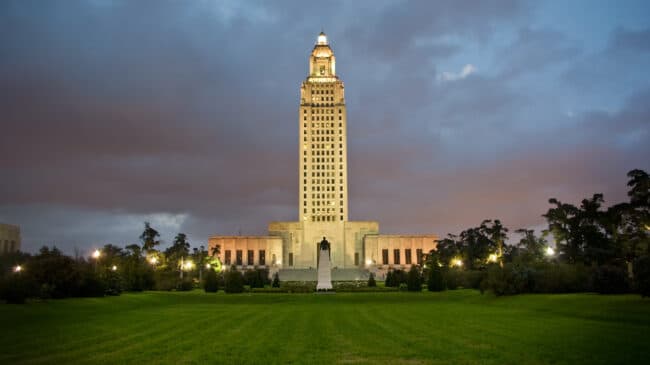The following public comment was submitted to the Louisiana House Committee on Judiciary.
On behalf of Reason Foundation, I thank you for accepting these comments and making them part of the public record. Among other things, Reason Foundation is committed to ensuring that state-regulated cannabis markets are designed in such a way that they remain dynamic and offer genuine economic opportunity to individuals from a range of backgrounds.
We applaud the overall intent of House Bill 17, which would create a regulated cannabis market for adults aged 21 and older. Following the passage of legislation earlier this year to enact a regulated cannabis market in Delaware, 22 states and the District of Columbia have now legalized the possession of cannabis in amounts reflecting personal use. Nearly all of these jurisdictions also provide for a regulated commercial industry to supply consumers with safe and legal products. It appears imminent that Minnesota will join this group and there is no sign that states intend to rescind their legal cannabis markets. Polls indicate overwhelming popular support for cannabis legalization. In other words, the movement toward legalization is expected to continue and Louisiana will have many state marketplaces from which it can glean insights.
Certain provisions of House Bill 17 are troubling, however, because they would establish substantial barriers to entry that will result in a less dynamic marketplace offering fewer opportunities to entrepreneurs and professionals and fewer options to consumers. In particular, §4765(A)(1)(a) would limit the total number of producer licenses statewide to 10 while §942(B)(1) would limit the total number of retailer licenses statewide to 40. These limits are arbitrary. Similar limits in other states have led to public corruption of both state and local officials who make decisions about the award of these licenses. Moreover, arbitrary license caps tend to result in market concentration by well-heeled license applicants while entrepreneurs of modest means are frozen out of the industry. As in the markets for all consumer goods, demand is the best regulator of supply.
§4767(C)(1) and §943(B)(1) allow regulators to charge up to $100,000 for the award of a producer or retailer license. Similarly to license caps, these fees establish a high barrier to entry into the marketplace that ensures only well-capitalized firms gain access. Together license caps and high fees can impair market dynamism and social equity within the regulated cannabis industry. We recommend that states actively seek to minimize these barriers to entry.
The producer licenses described in §4765(A)(1) require vertical integration from cultivation to the packaging of retail goods. In most states, cultivation and manufacturing are separate license types because each function requires different forms of capital equipment and expertise to accomplish. By contrast, a proposal for vertical integration of these functions further elevates the capital requirement necessary to participate in the market because a licensee must have the wherewithal to construct multiple types of facilities and retain the expertise to operate them. Again, this structure will make the market less dynamic. We recommend allowing licensees to operate at the size and scale they can manage by separating these functions into multiple license types.
§4765(A)(1)(b) requires producer licenses be geographically apportioned throughout the state. Lawmakers may be concerned about consumer access to lawful products because so-called “cannabis deserts” can result in a proliferation of illicit activity. However, access can be addressed through geographic apportionment of retailers alone. Consumers would not be able to purchase directly from wholesalers and so wholesaler location is irrelevant to consumer access. In fact, cannabis producers often prefer to cluster their operations in close proximity for two reasons: (a) they can share services like farm labor or security and (b) they can reduce costs and experience synergies by locating closely to other members of the supply chain. We recommend eliminating the geographic apportionment of producers.
§4765(B)(2) and §942(A)(2)(c) would grant preference in licensing to residents of Louisiana. Federal courts have been clear that residency requirements or preferences violate the Dormant Commerce Clause of the United States Constitution, which prohibits state barriers to the free movement of people, capital, and goods. The federal First Circuit Court of Appeals recently struck down residency requirements in Maine.
§947(3) would make it unlawful for a cannabis retailer to sell or give away any consumable product that is not a cannabis product, including pre-packaged food or water. At a minimum, retailers should be able to sell or give away pre-packaged non-alcoholic beverages to prevent dehydration of consumers or employees.
§947(5) would forbid “entertainment of any type on the premises of a retail location.” Other jurisdictions have shown that retailers can safely provide entertainment and the provision of this entertainment may be a way for licensees to establish their competitive positions. In any case, the language used in §947(5) is overly broad and could be interpreted to mean a retailer cannot display a television set, for instance.
Many of the provisions contained in House Bill 17 are reasonable to achieve the objectives of a regulated marketplace, including the general powers and duties of the commissioner described in §4764. However, the scope of the bill could also be expanded in positive directions such as by facilitating financial services, clarifying the regulatory authority and taxing power of local governments, or accommodating home grows.
Key provisions missing from House Bill 17 also include a clarification that cannabis-related contracts are enforceable under Louisiana law, protections for holders of professional licenses who work with cannabis clients and protections for parents who lawfully consume cannabis.

